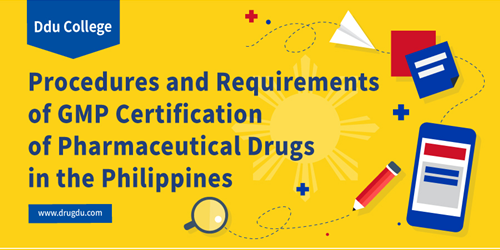Procedures and Requirements of GMP Certification of Pharmaceutical Drugs in the Philippines
April 3, 2018
Source: Ddu
 2,116
2,116

According to the latest data, the population of the Philippines has exceeded 100 million, and the demand for various types of medicine shows a steady increase. With the advancement of relations between China and the Philippines and collaborations in economy and trade, the Philippines has become a prime exporting country for Chinese pharmaceutical companies.
Before you can become eligible to set foot in the Filipino market, you have to become GMP certified for pharmaceutical drugs. Ddu, the leading global pharmaceutical & medical device B2B online platform, will share some insight we have gained on the process of GMP certification for pharmaceutical drugs in the Philippines. (Keep in mind that the Philippines is a member of ASEAN but not of PIC/S). Here follows an outline of the procedures for GMP certification of pharmaceutical drugs in the Philippines.

The documents needed for FDA certification in the Philippines are as follows:

In addition to this, overseas production companies applying for GMP certification in the Philippines are required to perform inspections unless the documents submitted for GMP certification are deemed to be absolutely complete. If the production company has a GMP certificate from a PIC/S member country or WHO prequalification, they can also apply for exemption from factory inspection. This does however depend on the characteristics of the specific product and the integrity of the documents.
The time for overseas inspections is decided by the number of auditing officials and their workload. The Philippine FDA usually accumulates a large number of applications for overseas inspections in order to perform inspections on multiple factories in the same area. Normally, a GMP audit for a production company includes document reviews and on-site inspections for production, which takes approximately three days and is conducted by two to three officials. (Reference standard: GMP requirements for PIC/S members). If the APIs and the drugs are produced separately in different plants, both will be subject to inspection, thus the time will be extended accordingly.
Ddu, the leading global pharmaceutical & medical device B2B online platform, has learnt that the Philippine FDA resumed overseas inspections in May 2017 after they were suspended in November 2016. Currently only inspections of oral formulations are available and applications for inspection of products with recertification will be given priority. Moreover, inspection of injections of biological agents (including vaccines) are on the way.
By DduRead more on
- 10 Triumphant Drug Launches Of The Decade August 26, 2021
- China’s Import and Export Market Report of Rheumatoid Arthritis Drugs August 26, 2021
- China’s Import and Export Market Report of Diabetes Drugs August 25, 2021
- China’s Import and Export Market Report of Contraceptive Drugs August 24, 2021
- What ingredients are in vaccines? December 17, 2019
your submission has already been received.
OK
Subscribe
Please enter a valid Email address!
Submit
The most relevant industry news & insight will be sent to you every two weeks.



